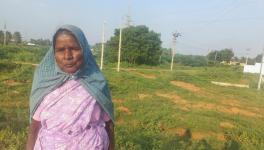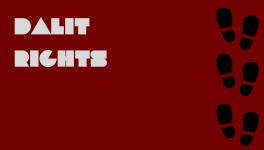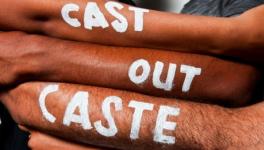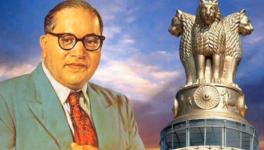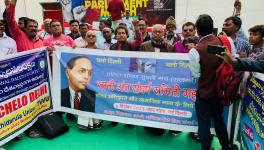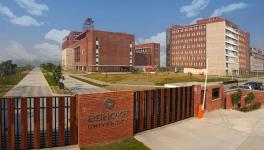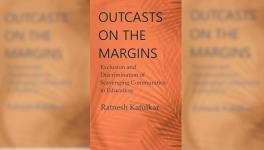My Harvard Degree is Symbolic of Aspirations of Millions of Dalits: Anurag Bhaskar
LiveLaw speaks to Anurag Bhaskar (LL.M. '19, Harvard Law School) about his decision to pursue law as a career, his experience as a law clerk to Justice D.Y Chandrachud, his journey to Harvard, LL.M. admission process, and his future plans.
Bhaskar has just completed his LL.M. degree from Harvard Law School. Before this, he pursued his B.A. LLB (Hons.) from Dr. Ram Manohar Lohiya National Law University (RMLNLU), Lucknow during 2012-17. He clerked for Dr. Justice DY Chandrachud (Judge, Supreme Court of India) during July 2017-18. Besides, he is a prolific commentator and has several academic articles and opinion pieces to his credit. He had written many articles in The Wire, LiveLaw, The Print and EPW. LiveLaw speaks to him about his decision to pursue law as a career, his experience as a law clerk, his journey to Harvard Law School, and his future plans.
Live Law: Congratulations on completing your LL.M. from Harvard Law School. How do you feel right now?
Anurag: I think it's overwhelming. My commencement happened on May 30, and it took me around a week to actually internalize that I have finished my education at Harvard Law School. Two years ago, I had not thought about studying at Harvard Law School or even coming to the US. In a struggling phase in the late 1980s, my father used to often cycle around 40 kilometers from a small village in Unnao district (in Uttar Pradesh) to Lucknow to search for a job. At that time, coming to Lucknow meant traveling to a foreign country to him. During my law school time in Lucknow, to think about shifting to Delhi for work was like moving to a foreign country for me. Coming to Harvard has therefore been a long journey for my family. Thus, I have mixed emotions, currently.
Why did you decide to pursue law as a career? Is anyone in your family into legal profession?
No! I am a first-generation lawyer. My decision to choose law as a career has majorly been shaped by one historic personality, Dr. BR Ambedkar. During my school days, Dr. Ambedkar's image of being the chief architect of the Indian Constitution immensely inspired me to study law as an instrument of social change. But choosing law wasn't easy. My parents wanted me to pursue engineering. Quite often, one of the first battles for individuals from the middle class, lower middle class and economically or socially weaker groups begins at home - convincing your parents about your choice of career. I am extremely grateful to my parents that in the end, they allowed me to pave my own path in life.
How was your law school experience at RMLNLU?
Quite enriching! From introducing me to the ideas and life of my social justice inspiration - Dr. Ram Manohar Lohiya, to helping me in learning to tap my own potential, RMLNLU Lucknow influenced me immensely. The University has one of the best campus infrastructures in the country. The library database is quite resourceful. We have some amazing teachers. I, however, still feel that RMLNLU as an institution is yet to realise its full potential. I also made few good friends, who have supported me, over all these years.
Tell us more about the extra-curricular activities that you did during your time at RMLNLU.
Unlike the general trend, I never did mooting or debating. Since I came from a Hindi-speaking background, I was not fluent in spoken English and for this reason, I hesitated in taking part in competitions/events which involved public speaking. However, instead of being overwhelmed by it, I focused on honing my other skills. I was actively involved in organising a lot of events at RMLNLU, which not only helped me in developing leadership and networking skills but also brought me in touch with activists and public office holders, doing amazing work on the field. I specifically cherish my work with Sandeep Pandey (Magsaysay Awardee – 2002, who works for the cause of right to education for underprivileged children) and Juhie Singh (former Chairperson, Uttar Pradesh State Commission for Protection of Child Rights). I value greatly, a field-based internship that I did under the guidance of Aditya Shrivastava (a human rights lawyer), which took me to Banda district in Uttar Pradesh to document the incidents and reasons behind farmer suicides in Bundelkhand region. I also worked with KA Pandey (Associate Professor, RMLNLU) in conducting India's first social audit of child-care institutions.
Apart from organisational skills, I also focused on my research and writing skills. In my last year of law school, four of my articles were selected for publication in the prestigious Economic & Political Weekly.
You had interned with seven different judges during your law school at RMLNLU. What made you undertake so many internships with judges?
I interned with a judge for the first time after my 3rd semester. The internship was with Justice Imtiyaz Murtaza (now retired) of the Allahabad High Court. The various interactions with him developed my interest in the work of judges. I decided to intern under more judges to learn as much as I could, while I could. I felt happy in contributing to their work. To repeat a dialogue from the movie Philadelphia, "It's that every now and again - not often, but occasionally - you get to be a part of justice being done. That really is quite a thrill when that happens".
At the Lucknow Bench of Allahabad High Court, I applied to judges handling different jurisdictions so that I could see different types of cases. I particularly enjoyed interning under Justice DY Chandrachud at the Supreme Court, and under Justices Devendra Upadhyaya, Rajan Roy and AR Masoodi at the Lucknow Bench.
Is this the same reason for doing a one-year clerkship at the Supreme Court?
The main reason I applied for a clerkship at the Supreme Court was because I wanted to work with Justice DY Chandrachud, who has been an inspirational figure to me since I heard him first in November 2013 when he came to RMLNLU's Convocation ceremony in the capacity of Chief Justice of the Allahabad High Court. Perhaps, I would have done something else if it weren't for an opportunity to learn directly from him.
How was your experience of working as a law clerk under Justice DY Chandrachud?
I think it was extraordinary. I feel like I have been one of the luckiest law clerks of all times. I got to work on so many landmark constitutional law cases, which were heard between July 2017–18. Besides, I also got to learn a lot from Justice Chandrachud's experiences, which he often shared with his law clerks. There is one anecdote which, I think, Justice Chandrachud wouldn't mind me sharing here. Once he narrated about the days when his father, late Justice YV Chandrachud, was a young lawyer. Senior Chandrachud would often go to a café (perhaps Kala Ghoda café/Wayside Inn) in Mumbai, and he always saw a man sitting there the entire afternoon, writing down his thoughts and making notes. That man was none other than Dr Ambedkar. Justice YV Chandrachud would also fondly recollect how he once appeared against Dr Ambedkar in a case.
Coming to that - last year in September 2018, Justice Chandrachud mentioned about you in one of his speeches at Vigyan Bhavan. He talked about your social background. If you are comfortable, please share something with our readers.
Yes, of course. I belong to the dalit community. It is one of my identities, but the one which has majorly shaped my life choices. Coming to Harvard was more than just about myself. Apart from the exposure that I got here personally and professionally, my journey to Harvard is symbolic of the aspirations of millions who are forced even today to live on the margins of society. My LL.M. degree from Harvard is a homage to Dr Payal Tadvi, who committed suicide, because of caste discrimination, even before she could complete her post-graduation. My LL.M. degree is a homage to Rohith Vemula, whose suicide letter shall always remain a constant reminder to our moral conscience as a nation that we ought to eliminate the prejudices in existence in our society.
My LL.M. degree is for people from lower castes, who have been murdered for riding a horse, for having a mustache and all such daily atrocities. It is for the dalits who have been denied access to water in drought-hit areas or were denied entry in cyclone shelters and deprived of relief packages after Fani cyclone had hit Orissa. I hope that my graduation from Harvard will inspire others, including little 14-year old Sunaina — whose story was recently shown by NDTV's Prannoy Roy during Lok Sabha elections. I hope that my graduation from Harvard inspires everyone to have big dreams, which may seem to be beyond one's reach.
Please tell us about your experience at Harvard Law School.
It was my dream to study at Harvard Law School, and to live your dream is one of the best feelings in the world. Harvard has so many wonderful opportunities to offer that it is indeed a Herculean task to actually utilise and explore all of them within the short span of 9.5 months of LL.M. Like one of my batch mates said, "You [need to] be an octopus to reach all the ends of Harvard and experiences that it brings". I feel fortunate to have studied with some legendary professors. Apart from the classes, I also got to learn a lot from my batch mates who hail from diverse cultures and social backgrounds.
To be precise, my batch consisted of students from 65 different countries, with working background in different domains such as law teaching and research, government service, the judiciary, international organisations, non-governmental organisations and private practice. For instance, I had never thought that I would be studying and sharing classes with Ashutosh Salil (an inspiring bureaucrat from Maharashtra cadre), Sheela Sail (a 50-year old police commissioner, also from Maharashtra), and a number of other inspiring people who are doing great work in their respective countries.
One can also cross-register courses at other schools of Harvard University (such as the Kennedy School, etc.) and Fletcher School. This offers opportunities to HLS students to be in touch with students pursuing different courses at other schools. Coming to the US also carved out the opportunity to meet and interact with Professor Michael Sandel (learned philosopher of our times) and Dr. Raghuram Rajan (former Governor of RBI), whose works I have always loved and followed closely.
What is your favourite memory at Harvard Law School?
The entire Harvard experience has been memorable. But, a few instances have really been powerful and inspiring. I would like to share three particular moments. The first one being this: On my last class of constitutional law in Fall 2018, Professor Jeannie Suk Gersen ended it on a very powerful note. She talked about the constitutional crisis in contemporary times, and the role, we, as practitioners of constitutional law, need to play. She got so emotional in talking about the importance of the Constitution, that she almost started crying, as she ended the class with the note, "It is the Constitution which acts as a boundary between us and tyranny". The passion and attachment to protect the Constitution left me in complete awe of both the teacher as well as our responsibility to do the same.
The second one is the 'Last Lecture' to the graduating batch, delivered by Professor Michael Klarman in April 2019. Professor Klarman said that the work of pioneering civil rights lawyers evinces hope and resilience in today's social and political landscape, when our generation faces so many challenges. Professor Klarman's work on civil rights has always been inspiring. My third favourite memory is about my admiration of former US President Barack Obama. Since he also graduated from Harvard Law School in 1990s, I craved for first-hand stories about him from Professors who taught him. Professor Wilkins once told me how Obama was always clear in mind that he wanted to work in the community after the end of his studies at Harvard Law School. During a conversation with Professor Martha Minow (former dean of Harvard Law School), she shared that Barack Obama was not a frequent speaker in classroom, but whenever he spoke, he did it with such conviction that people would listen to him quietly.
Apart from these instances, going out for lunch with some of my favourite Professors will always be etched in my memory.
You are the first student from RMLNLU to make it to LL.M. programme of Harvard Law School. Most probably, you are also the first one from dalit community to have LL.M. degree from Harvard Law School. How do you feel about it?
To answer this better, I would like to quote a favourite movie dialogue from Tobey Maguire's Spider-Man, where Peter Parker says, "Whatever life holds in store for me, I will never forget these words: With great power, comes great responsibility". I think this applies to success and achievements also. With every success, comes great responsibility — the responsibility to be able to not only utilize the lessons in building a better tomorrow for everyone, but also to be able to critically analyse and accept our own fault lines, as and when required.
At the same time, I feel that it is imperative to acknowledge people who have supported you. I would specifically like to acknowledge and thank six ladies, who were my constant guides and supporters during my Harvard admission process: Poonam Jayant Singh, Puja Awasthi, Divya Tripathi, Apurva Vishwanath, Shree Agnihotri and Savita Devi.
What are your future plans?
Every day, we read news about the death of our citizens while cleaning sewers and septic tanks. We read about the death of our citizens due to hunger. There are many similar problems which require simultaneous work in different sectors. I am, therefore, interested in working in academia, litigation, policy and politics. It is indeed impossible to be an active part of all four and I will have to figure out numerous professional milestones to balance the work in all these areas. As Professor Richard Lazarus noted in his keynote address during Harvard Law School's 2019 Class Day ceremony in May 29, "Do not measure your life by your Harvard Law School degree, but by what you do with it". I am, therefore, looking forward to returning to India.
(These are edited excerpts)
Get the latest reports & analysis with people's perspective on Protests, movements & deep analytical videos, discussions of the current affairs in your Telegram app. Subscribe to NewsClick's Telegram channel & get Real-Time updates on stories, as they get published on our website.










